I love books. I want books. Post-Christmas I’m in the enviable position of having – not money, but in a way even better, virtual money that can only be spent on books. What I don’t have though, is a lot of space for books. So, periodically pruning the library (too grand a word) or book collection (worse?) or “my books” (better) is a painful necessity. But what to prune, and why? So far, every single time I’ve put together a box of books and dispersed it to charity shops I’ve almost immediately ‘needed’ one of the books I purged. On a few occasions (see here) I’ve bought back books (not the same actual copy though; I’m not that bad, yet) that I got rid of. And I’ll probably do it again, but I’m trying not to.
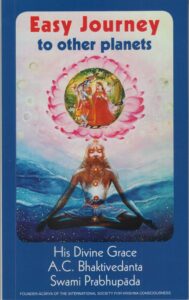 Why is it painful to get rid of books? Pompously, because the books you own are a reflection of yourself; of skins shed and personalities outgrown and discarded, and in a way a direct line back to your (possibly alarming) former selves with their sometimes alien tastes and enthusiasms.* Less pompously, because in general, I want more books, not fewer. I can’t think of an occasion when I got rid of a book simply because I didn’t like or just didn’t want it, though I’m sure it’s happened. And so, for decades I still owned (and may still have somewhere) the little red Gideons Bible that was given out to pupils when starting high school (do they still do that?). Its bookplate (ex-libris? Both terms seem very archaic) hints strongly at the typical kind of 12 year old boy that it was given to: Name: William Pinfold Form: human. Similarly, I may still have the books given to me in the street by Hare Krishna followers, which seems not to happen now but was a frequent enough thing in the early 90s that I can still remember without checking** that they were credited to and/or consisted of teachings by “His Divine Grace A.C. Bhaktivedanta Swami.” They often had nice, pleasingly psychedelic cover paintings but were invariably disappointing to try to read because, even when they had amazing titles like Easy Journey to Other Planets, they were all about Krishna consciousness – who knew?. But these are books that would be impossible to replace (in a personal sense; easy enough to get hold of different copies of them). More complicatedly – and just annoyingly, with space at a premium, I have multiple copies of some favourite books and will probably buy even more copies of them, if I come across them with covers that I like but don’t have and if they are cheap.
Why is it painful to get rid of books? Pompously, because the books you own are a reflection of yourself; of skins shed and personalities outgrown and discarded, and in a way a direct line back to your (possibly alarming) former selves with their sometimes alien tastes and enthusiasms.* Less pompously, because in general, I want more books, not fewer. I can’t think of an occasion when I got rid of a book simply because I didn’t like or just didn’t want it, though I’m sure it’s happened. And so, for decades I still owned (and may still have somewhere) the little red Gideons Bible that was given out to pupils when starting high school (do they still do that?). Its bookplate (ex-libris? Both terms seem very archaic) hints strongly at the typical kind of 12 year old boy that it was given to: Name: William Pinfold Form: human. Similarly, I may still have the books given to me in the street by Hare Krishna followers, which seems not to happen now but was a frequent enough thing in the early 90s that I can still remember without checking** that they were credited to and/or consisted of teachings by “His Divine Grace A.C. Bhaktivedanta Swami.” They often had nice, pleasingly psychedelic cover paintings but were invariably disappointing to try to read because, even when they had amazing titles like Easy Journey to Other Planets, they were all about Krishna consciousness – who knew?. But these are books that would be impossible to replace (in a personal sense; easy enough to get hold of different copies of them). More complicatedly – and just annoyingly, with space at a premium, I have multiple copies of some favourite books and will probably buy even more copies of them, if I come across them with covers that I like but don’t have and if they are cheap.
*case in point; I had forgotten how much I liked Camille Paglia in the days before libertarianism was an essentially standard right-wing-asshole viewpoint and when her provocative/confrontational ideas didn’t yet include being disingenuously frivolous about child abuse
** I’m only human though; I spelled his name wrong until looking out a picture of the book, Possibly absorbing his teachings might have helped?
So yes, I have quite a lot of books; but although ‘book collectors’ exist, I don’t qualify as one. Collecting is deliberate and with presumably, a specific end point in view; a collection. Collecting things is fun up to a point, but ultimately a thankless and frustrating task without the required personality type. It (fleetingly) irritates me when an author I like has written four or five books and the publisher changes the cover design or size after the first few, so the mismatched chaos of a complete collection is not for me. Not to mention that there are writers – Michael Moorcock, in print since the 1950s and as far as I know still writing, is the obvious example for me – who have, over the course of decades, written a ridiculous number of books, which have appeared under countless imprints in myriad editions and countries and therefore offer an opportunity for an epic and soul-crushingly futile quest for the true completist. I am not that completist.
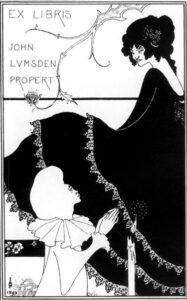
On the other hand, following the old stately home-library tradition of having a personalised ex-libris/bookplate/sticker thing, with its individualistic iconography always seems like a nice idea – even if it’s essentially just a picturesque way of writing your name in a book, which I would never do. It’s nice see a decorative ex-libris in an old book, but although the thought of having one’s own books personalised in that way is nice, the reality of actually sticking them in the books – fun for maybe the first ten or twenty, but after that too tedious to consider, is not so appealing. So, not a collector; but even not a true bibliophile either, at least in the sense that sometimes is written about. I do love books, but not all or any books, I don’t contemplate, like a wine taster, the smell of old books. There are of course books with distinctive odours, some pleasant (to me) like the dry and somehow slightly spicy smell (probably best to not think too much about) of old calf-bound volumes from the 18th century and earlier, others less so, like the peculiarly vomit-like bouquet of new children’s books. And though browsing through shelves and rooms of books can be and usually is an entirely pleasant pastime, after the excitement has faded there can be something a little depressing about looking through piles of chilly, mildewy, corrugated and fat-with-damp paperbacks in the bigger, more drafty and warehouse-like charity shops or auction rooms.
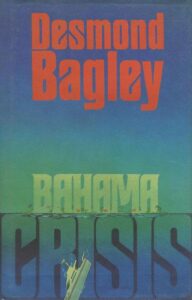
Still; books are artifacts in themselves and not just valuable for their contents. Though judging books by their covers is frowned on, that’s kind of what the covers are for. I’ve written about this stuff in several places before so won’t go on about it here, but there’s never been a time that I’ve read as hungrily or as indiscriminately as when I was a child, and until I found authors that were trustworthy – I will try to get onto the second part of that Robert Westall feature some time this year – covers were the thing that drew me in. I loved fantasy, history and sci-fi, so covers were what made books leap off the shelves of the local library or school library. And there were somehow never enough books to read, so that when, aged 12 – 14 or so, our English teacher required pupils to take books out of the school library every week, it was a perfect opportunity to branch out. After a fairly short time the kind of books I automatically wanted to read had been exhausted and it was necessary to try something else. It’s a strange thing, reading not-for-you books, kind of like trying on other people’s clothes, but I gave it a go, as I have a few times since then*. The book that stands out in my memory – or at least its cover does – is Desmond Bagley’s Bahama Crisis (1980). Being a newcomer to men’s thrillers (still an alien world mostly) I think I was expecting, without much excitement, James Bond (never a fan)-style action, but as I very hazily remember the book was mostly a soapy kind of story about the difficulties of running a hotel in the Bahamas.(??) I didn’t mind it, but although records tell me** that I got more Desmond Bagleys out of the library – I had to get something – none of them, or their titles or even their covers stick in my mind at all.
*reading not-for-me books, not trying on other peoples’ clothes ** there’s a list in an old school jotter which I never threw away
It’s hard to imagine, as the world has become ever-more commercially driven, but it feels like publishers nowadays underestimate the seductive power of a good cover design (though what constitutes a good one is obviously subjective). There are several authors I liked as a young adult – Milan Kundera, Ian McEwan and Truman Capote spring to mind, but so (who would have thought it?) does Jean-Paul Sartre – who I might well never have read at all if I didn’t find the covers of their books so alluring. In retrospect the late 80s/early 90s seems like a golden age of book design to me, and don’t think it’s entirely because of the age I was when I first saw them. I was still only in my early 20s a few years later when book jackets became dominated by neon, acid colours and deliberately jarring designs and those left me cold at the time and look dated now. The covers I associate with that ‘golden age’ are entirely typical of the look that much literary fiction was going for at the time.

Have there ever been cooler looking books than the 80s Faber & Faber or “King Penguin” (whatever happened to King Penguins?) Milan Kunderas? Or Russell Mills‘ genius covers for Picador’s Ian McEwans? Is it just a coincidence that they have a lot in common Dave McKean’s graphic novel designs of the time like Violent Cases and Arkham Asylum or Bill Sienkiewicz’s Stray Toasters? And though Penguin Modern Classics still look good now have they ever looked better than the pale green spines and black and white photo covers of that period?


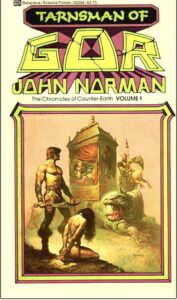
Of course covers can mislead too; much as Peruvian painter Boris Vallejo is some kind of genius, one quickly learned that his covers were no guarantee of quality. Everything about John Norman’s Gor series – the sub-Tolkien/Robert E Howard setting, the Vallejo (and Vallejo imitators – of whom there were many) artwork, the swords and sorcery and gratuitous violence and sex – were guaranteed to appeal to the male, teenage fantasy fan; and yet the books were bizarrely dull to read. Actually, to be fair to Norman, the sex in the Gor books is hardly gratuitous, since it’s basically the whole point of the series; but the endless, tedious essays about masculine power and the bondage fantasies that pepper his books; without the thrill of the quest or even an alleviating sense of humour, is definitely an acquired taste. It was good to read, years later, Micheal Moorcock – along with Tolkien my favourite fantasy author – writing about how boring and tacky the Gor books were. I didn’t think it could just be me. Of course, Moorcock attacked Tolkien too, but though his essay Epic Pooh is not only a good read, but also hard to argue with at times (Moorcock’s main point is that Tolkien is conservative in his worldview and reproduces the class outlook and prejudices of his generation in his fiction) somehow Tolkien’s books resist the criticism effortlessly, if you’re a fan. I think it’s because for Tolkien, the background and history and world-building (as I believe they say nowadays) was the main point of interest, whereas for most subsequent heroic fantasy authors, all that is just the window dressing, so that Middle Earth feels real and believable in a way that most fantasy “realms” don’t. I don’t think there’s any point in Lord of the Rings where the reader has a question that they feel Tolkien couldn’t answer satisfactorily. That said, I imagine sex-related questions would have made him uncomfortable, whereas John Norman might not be able to tell you the detailed history and folklore of Counter-Earth as Tolkien could with Middle Earth, but he could definitely tell you which ropes, gag or whips are favoured by which tribes.
So; looking through my books there are many different versions of myself; because you read books that reflect your interests but often you also get those interests from books themselves. From the age of 8 or so, the Fighting Fantasy role-playing game book series cut across many of my interests. But even then, those books appealed to the child-me in the first place because I loved history and mythology and legends and Asterix the Gaul. But I’ve written more about children’s books and related subjects here and here and here and here and probably elsewhere too, so will try not to repeat myself. It’s easy to think of books that had a big influence on my interests as a child – the version of me that wanted to be an archaeologist wasn’t just thanks to Indiana Jones; before I ever saw Raiders of the Lost Ark I was already fascinated by the Aztecs and Incas because of Tintin and the Romans via Asterix – but also those things plus Ancient Egypt, Ancient China, the Normans, medieval history and knights etc via a big book called The History of the World that I got at a Primary School “Bring & Buy Sale” when I must have been 8 or so. That book had – still has in fact – painted illustrations that I remember vividly; ancient Sumerians, Julius Caesar being stabbed to death in the forum, ancient Greek ladies in strange clothes that exposed their breasts; mysteriously exciting even to an 8 year old, Genghis Khan on his horse, Viking raiders etc, etc. The me who loved space stuff was partly thanks to excitement about the space shuttle program (admittedly that cooled off after the Challenger disaster) and Star Wars, but also 2000 AD comic and the very badly-bound but beautiful reprints of old Dan Dare comics that Paper Tiger published in the early 80s)
But all this is getting away from the point, which is that book ownership is not just about reading. Books like the Bible or Easy Journey to Other Planets are not being kept to read, any more than E.W. Hildick’s Deadline for McGurk, a towering masterpiece as a kid but probably unreadable as an adult, or the different variants of The Fellowship of the Ring or JG Ballard’s Crash that take up valuable shelf space. Getting rid of them would feel wrong, at least unless there was a good cause or if more worthy books come along and the space must reluctantly be yielded to them. That’s the not-so-great thing about having book tokens to spend; the need to consider, plan and use them wisely. I probably won’t.
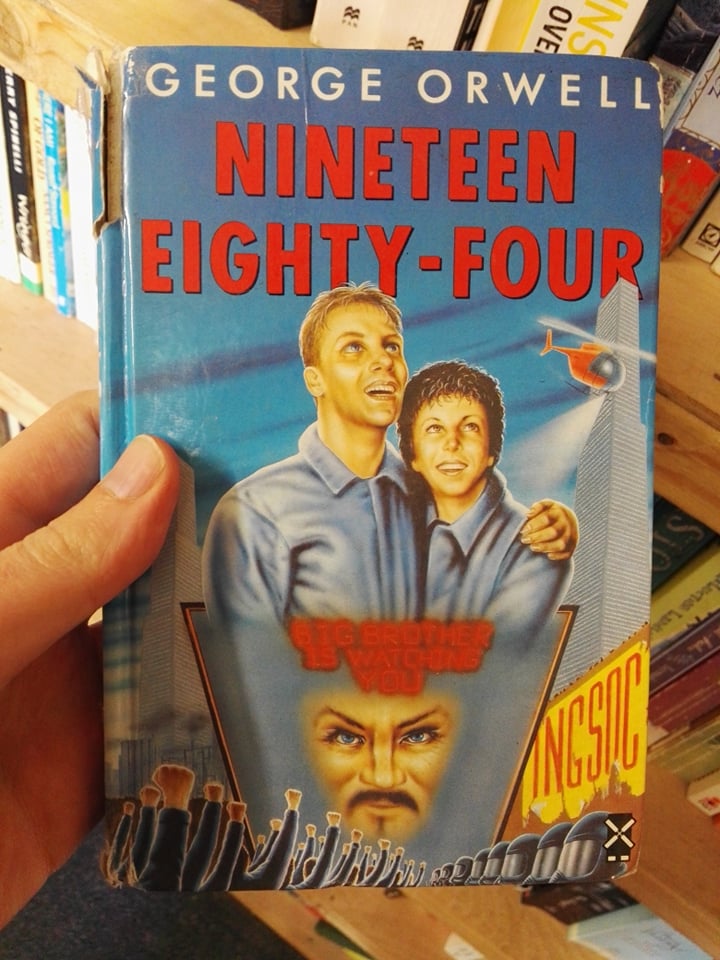


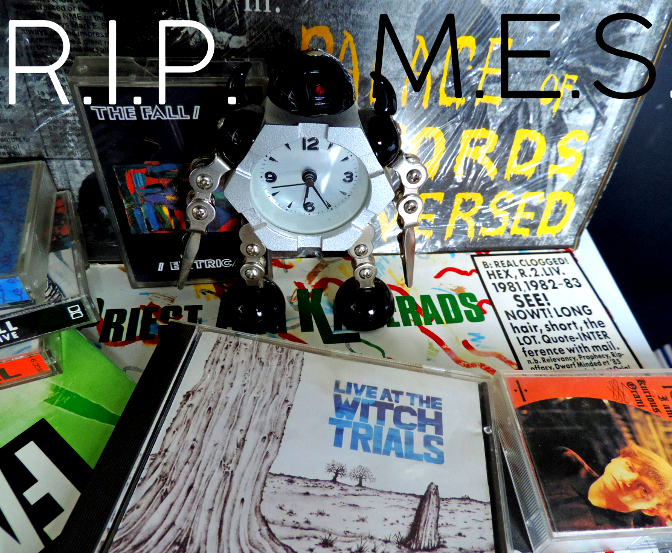
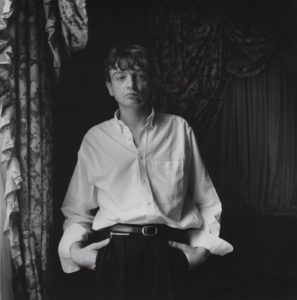
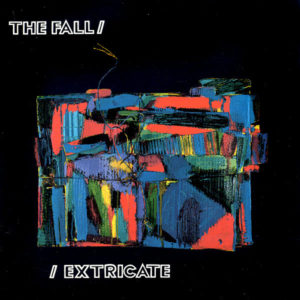
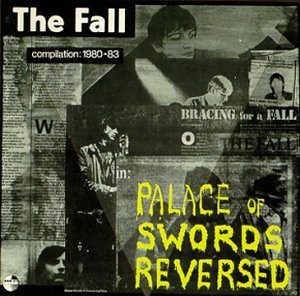 sophisticated, articulate, menacing but not unfriendly. A few years later, when I began to read
sophisticated, articulate, menacing but not unfriendly. A few years later, when I began to read 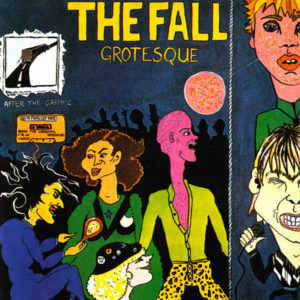 And that’s just the lyrics; another thing about The Fall that made an impression on me early on was that, although MES was incredibly fussy and perfectionist about the band’s music, he wasn’t snobbish in the usual way; no tune, if it was catchy, was too silly for Mark E. Smith. Think of the speedy but somehow miniature-sounding rock guitar on ‘Underground Medicine‘ or loping, bouncy beat to ‘Gramme Friday‘ or the oddly jaunty, countryish ‘Fit And Working Again‘. or the kazoo on ‘The North Will Rise Again‘– this was ‘angular’ (the definitive descriptive term for late 70s/early 80s UK indie rock) if you like, but it was not standard ‘post-punk’ music, nor was it (as it could easily have been) twee in that beloved ramshackle UK indie/C86 kind of way. Perhaps because Mark E. Smith was not (99% of the time) a melodic singer, the band could play anything behind him and it sounded right. When, at the beginning of one of my favourite songs, ‘Slates‘, MES shouts ‘this is the definitive rant‘ he’s nailing part of the charm of his work. As long as the rant was in place, no tune was too small, too jingly or too silly to make something worthwhile out of.
And that’s just the lyrics; another thing about The Fall that made an impression on me early on was that, although MES was incredibly fussy and perfectionist about the band’s music, he wasn’t snobbish in the usual way; no tune, if it was catchy, was too silly for Mark E. Smith. Think of the speedy but somehow miniature-sounding rock guitar on ‘Underground Medicine‘ or loping, bouncy beat to ‘Gramme Friday‘ or the oddly jaunty, countryish ‘Fit And Working Again‘. or the kazoo on ‘The North Will Rise Again‘– this was ‘angular’ (the definitive descriptive term for late 70s/early 80s UK indie rock) if you like, but it was not standard ‘post-punk’ music, nor was it (as it could easily have been) twee in that beloved ramshackle UK indie/C86 kind of way. Perhaps because Mark E. Smith was not (99% of the time) a melodic singer, the band could play anything behind him and it sounded right. When, at the beginning of one of my favourite songs, ‘Slates‘, MES shouts ‘this is the definitive rant‘ he’s nailing part of the charm of his work. As long as the rant was in place, no tune was too small, too jingly or too silly to make something worthwhile out of.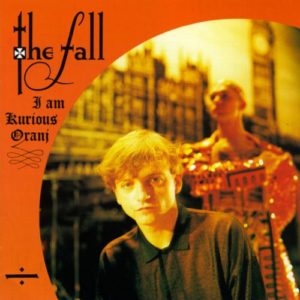 lot of it, and it was mostly pretty affordable, especially the stuff from the band’s then slightly maligned, now justly celebrated mid-80s period of relative commercial success. In itself, that success was odd and underlined just how unique the band, and specifically Smith’s vision, was. I loved that Mark E. Smith saw nothing elitist or strange about working with a ballet company, or in writing for the theatre and working with ‘serious’ artists and yet the people I knew who derided Morrissey as being “poncy” never seemed to think that about MES. The fact that he refused to separate the ‘high’ arts from his work with The Fall was so powerful. Everyone knows, for example, that Brian May is an astrophysicist, but imagine if astrophysics had somehow been indivisible from his work with Queen; they would have been far a more peculiar and far less successful, but also (with no offence intended to the band or its members) probably more interesting band.
lot of it, and it was mostly pretty affordable, especially the stuff from the band’s then slightly maligned, now justly celebrated mid-80s period of relative commercial success. In itself, that success was odd and underlined just how unique the band, and specifically Smith’s vision, was. I loved that Mark E. Smith saw nothing elitist or strange about working with a ballet company, or in writing for the theatre and working with ‘serious’ artists and yet the people I knew who derided Morrissey as being “poncy” never seemed to think that about MES. The fact that he refused to separate the ‘high’ arts from his work with The Fall was so powerful. Everyone knows, for example, that Brian May is an astrophysicist, but imagine if astrophysics had somehow been indivisible from his work with Queen; they would have been far a more peculiar and far less successful, but also (with no offence intended to the band or its members) probably more interesting band.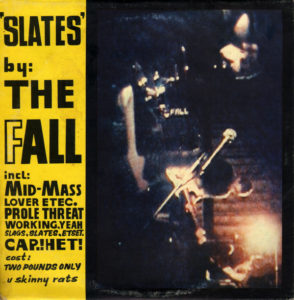 Although most of my favourite Fall albums are the early ones (especially Dragnet, Grotesque (After The Gramme) and Hex Enduction Hour) those 80s albums with the Mark and Brix-led lineup(s), especially The Wonderful and Frightening World Of The Fall are pretty unassailable and perhaps the least overtly commercial ‘commercial’ period of any band I can think of. The band stayed good though, and although I am not a Fall completist (a vocation rather than a hobby) I’ve found that any Fall record one picks up will have something great on it; and there aren’t many bands with a 40 year career you can say that about.
Although most of my favourite Fall albums are the early ones (especially Dragnet, Grotesque (After The Gramme) and Hex Enduction Hour) those 80s albums with the Mark and Brix-led lineup(s), especially The Wonderful and Frightening World Of The Fall are pretty unassailable and perhaps the least overtly commercial ‘commercial’ period of any band I can think of. The band stayed good though, and although I am not a Fall completist (a vocation rather than a hobby) I’ve found that any Fall record one picks up will have something great on it; and there aren’t many bands with a 40 year career you can say that about.